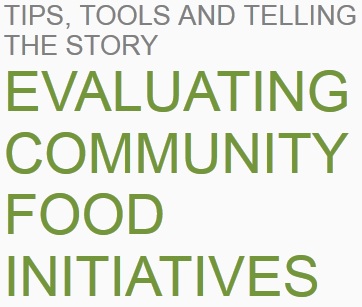Evaluating Community Food Initiatives Learning Module now available online
Posted: October 4, 2012
Categories: Food in the News / News from Sustain Members
 Community Food Centres Canada (CFCC) has developed the Evaluating Community Food Initiatives learning module as a framework to allow community food initiatives to measure and demonstrate their impact in areas such as health, social inclusion, civic engagement and sustainable food systems. The CFCC envisions these tools as ways to share their experience with evaluation thus far in order to help other groups along their path of creating an evaluative organizational culture.
Community Food Centres Canada (CFCC) has developed the Evaluating Community Food Initiatives learning module as a framework to allow community food initiatives to measure and demonstrate their impact in areas such as health, social inclusion, civic engagement and sustainable food systems. The CFCC envisions these tools as ways to share their experience with evaluation thus far in order to help other groups along their path of creating an evaluative organizational culture.
Tips, Tools, and Telling the Story – Part 1 from Community Food Centres Canada on Vimeo.
The module includes video footage from the related webinar along with a dozen downloadable resources including presentation slides, logic models, program overviews, evaluation guides and primers, annual program surveys! These resources can be found in the ‘Downloads’ tab under the purple sidebar on the right-hand side of the screen. The content is entirely free but requires a Learning Network account to be accessed. People without an account can easily register to benefit from the material.
In the videos, Meredith Davis, Community Food Centres Canada’s Research and Evaluation Manager, describes the process that CFCC went through to create its own national evaluation strategy, including, creating a theory of change, developing indicators, designing effective evaluation tools, developmental evaluation (DE), social return on investment analysis (SROI), evaluating in a respectful and dignified manner, and building an evaluative culture.
The breakdown of the five parts is as follow:
Part 1 – Introduction, context and developing an evaluation strategy
Part 2 – Addressing strategic objectives: theory of change, program logic models and matrices
Part 3 – General principles and evaluation tools
Part 4 – Indicator selection, developmental evaluation, and SROI
Part 5 – Communicating findings, evaluating respectfully, and building an evaluative culture
Answers to the questions raised during the Q&A sessions at the end of the webinar can be found here on the Learning Network blog.
In addition to the resources produced by the CFCC, the Learning Module includes additional downloadable resources from the McConnell Foundation and others that helped guide their evaluative processes.
